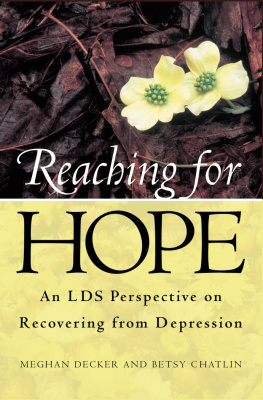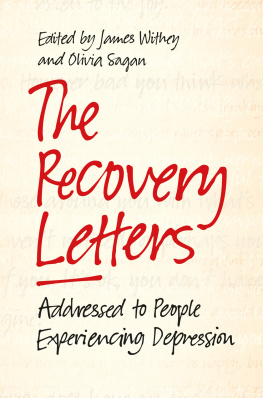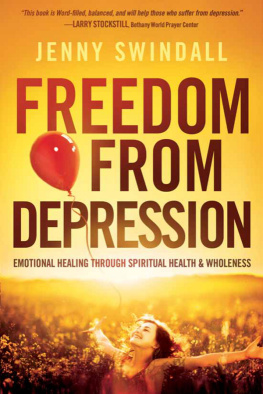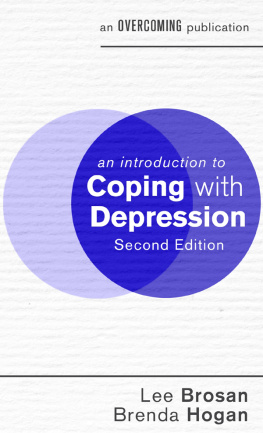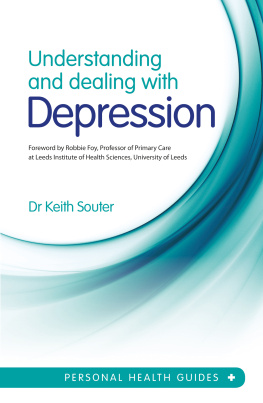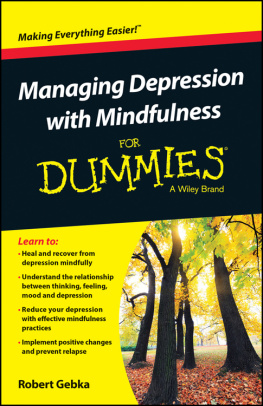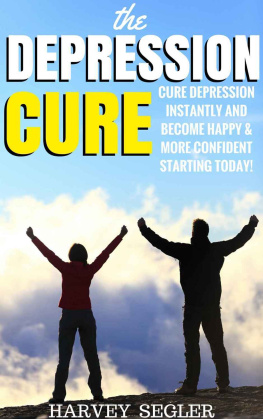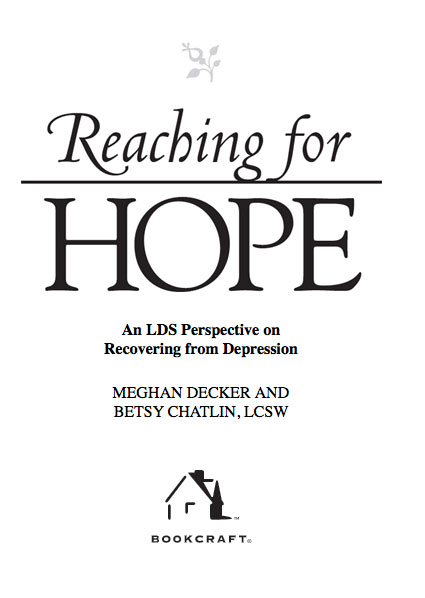2000 Meghan Decker and Betsy Chatlin.
All rights reserved. No part of this book may be reproduced in any form or by any means without permission in writing from the publisher, Deseret Book Company, P.O. Box 30178, Salt Lake City Utah 30178. This work is not an official publication of The Church of Jesus Christ of Latter-day Saints. The views expressed herein are the responsibility of the author and do not necessarily represent the position of the Church or of Deseret Book. Deseret Book is a registered trademark of Deseret Book Company.
Library of Congress Cataloging-in-Publication Data
Decker, Meghan.
Reaching for hope: an LDS perspective on recovering from depression / Meghan Decker and Betsy Chatlin.
p. cm.
Includes bibliographical references.
ISBN 1-57345-849-X (pbk.)
1. Depression, MentalReligious aspectsChurch of Jesus Christ of Latter-day
Saints. 2. Depressed personsReligious life. 3. Decker, Meghan. I. Chatlin,
Betsy. II. Title.
BX8643.D44 D43 2000
248.8'625dc21
00-044495
10 9 8 7 6 5 4 3 2 1
15778-6740
For my best friend and husband, David,
and for my delightful daughters
Rachel, Mary Beth, Ruth, Elise, and Rosalind.
I wanted to provide an easy Eden
for my family, but I am grateful
for the wisdon we gained together instead.
M. D.
For Gene, Laurie, Kristina, and Jani.
B. C.

All names in this book have been changed,
with the exception of the primary authors and their families.
In addition, in some cases further identifying
details have been altered.

Acknowledgments
From Meghan
The Lord has blessed Betsy and me in our ability to work together to produce this book. It would have been impossible without his direction.
We also had the encouragement and help of many friends and family members. My parents, Ed and Colleen Peters, provided a home environment that encouraged initiative, faith, study, writing, and lots of discussion and questioning. Those characteristics helped me to fight depression's grip. My brother, Kevin, and his wife Pam have given me loving encouragement throughout my life, and especially during the writing of this book. My husband David, and my children Rachael, Mary Beth, Ruth, Elise, and Rosalind have been willing to put up with the days that I have produced more pages than meals. Thank you, David, for all the fresh bread, waffles, and quesadillas.
My family has also been willing to expose some of our not-quitehealed wounds in the hope that our experiences will help others through their own dark times. I thank David and Rachael for the writing they have done, and David and Mary Beth for their willingness to wade through the completed manuscript and make editorial suggestions, all of which were useful.
I also acknowledge the other readers who helped us when Betsy and I were too close to the manuscript to see it clearly. Jerelyn Decker (David's mother, a highly intelligent woman with wonderful editorial skills and the unusual ability to wait to be asked for her opinion), Margot Baker, Denise Palmer, and Kristen Baker all helped us with the final manuscript.
We appreciate the passion and strength of the contributions we have received from women who were willing to delve deeply into painful emotions to respond to our requests for their stories. Though we cannot thank them by name, we applaud their selflessness and courage. None of them considered herself a writer, yet the power of their experiences speaks strongly to the reader.
David Decker contributed the bishop's viewpoint, and Kurt Southam wrote from the perspective of a stake president. I thank them for their contributions, and also for the wise, tender leadership they have provided in their callings.
Finally, it seems unfair that Jennifer Adams's name doesn't appear as a co-author. She is our editor at Deseret Book and has put a great deal of labor into refining the manuscript we presented. In addition, I've enjoyed working with Emily Watts, also of Deseret Book, as she tried to decide what to do with this manuscript that appeared out of the blue. Her encouragement and her commitment to publishing a book on clinical depression have been instrumental to our success in bringing this book to you.
From Betsy
When I consider all the choices I have made in my life, I am grateful to remember that almost all of my really good ones involved having someone I loved or respected view the "best" in me.
I wish to thank all those who, as major influences in my life have inspired me, propelled me, and sometimes even confronted me to choose the more excellent way. My personal cheerleaders include my mother, my uncle Phil, my aunt Elbie, my cousin Nancy, my cousin Bow, and my daughters, Laurie, Kristina, Jani; Elder Mike Enfield, Elder Mark C. Porter, Elder Ron Bitter (the three missionaries who taught me the restored gospel of Christ); my first ward family, including Bishop Ted Lansing, Doris Lansing, Linda, Lydia, and Carolyn; my BYU coalition, including Mary Lou, Marsha G., Darlene, Carol G., Dr. J. Joel Moss, Dr. Lamar C. Berrett, Jim S., Linda Kay, George, Sharon T., Bishop Berrett, Karen M., Sue B., MaryBeth W., Bishop Sterling Albrecht; my amazingly wonderful neighbors for twelve years, including Dixie, Bill, Bishop Bud Mix, Mary, Joan, Hilda, Werner, Jon, Bishop J. Lewis Taylor, Betty S., Alton, Win, Dawnetta, Rulon (the world's greatest home teacher) and Don Corbett.
Beginning my new career in social work, a whole new world of contributors to my life emerged: Marge E., Luta, Gene, Jan, Jill, Karie, Brad, Dick Mac., Joy, Opal, Ginny H., Beth C., Annie A., Carol M., Ann B., Connie B.P., Kassie, Jan B., Jan and Bill R., Lana, Derrill, Dell, President Randy Wilkinson, Carol G., Sara, Rebekah J., Margie, Nancy A. Also to my new friends of Kalamazoo, MI: Pam, Marlene, Arlene, Lisa, Shawna, Gail, Kim, Julie, Cathy, Judi, Lynn, President Dana Nickens, and Bishops Erickson, Cowles, Thomas, and Kellogg. And to my newest friend in Kalamazoo: Meghan Decker, without whomobviouslythis book would never and could never have been written.
Final thoughts and big thanks to the eight women who courageously and graciously shared their stories with you, our readers, and to the three psychiatrists who read selected excerpts for clinical and psychiatric accuracy: Dr. Joy Ely (retired, former Medical Director of Southwest Utah Mental Health), Dr. Ted Wingate (current Medical Director of Kalamazoo County Community Mental Health), and Dr. Gabrielle Lieberg (staff Psychiatrist at KCCMH). And finally, to Greg, the Chili's manager who put up with the four hour lunches as we initiated our book in the Chili's booth.
Preface:
Weeping May Endure for a Night
Denise is in the Young Women's presidency in her ward. The girls love and admire her. She graduated from BYU, where she met her husband, a successful and kind man who loves her and their four children. He is an involved father and regularly takes his wife out on a date to give her a break from her responsibilities. Denise has lots of friends; she is considered an intelligent, funny, giving woman. Why does she wish she were dead?
Denise is a victim of clinical depression, a brain disorder in which her own distorted thoughts affect her perception of the world around her and bury her in a deep pit of hopelessness and despair. She finds herself unable to feel the comfort of the Spirit; when she prays she feels that a lead ceiling covers her head. She is sure the Lord considers her unworthy of his comfort or direction.

